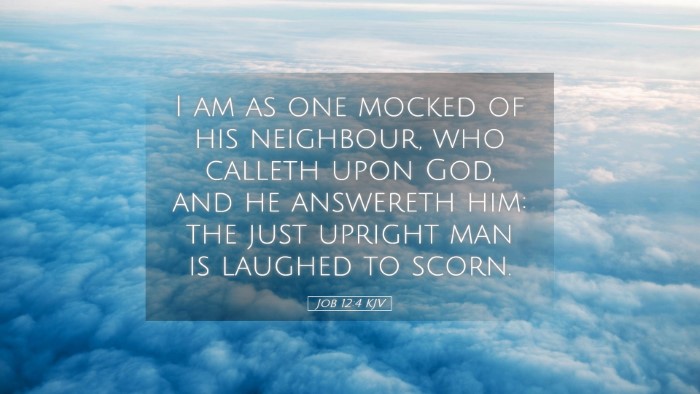Old Testament
Genesis Exodus Leviticus Numbers Deuteronomy Joshua Judges Ruth 1 Samuel 2 Samuel 1 Kings 2 Kings 1 Chronicles 2 Chronicles Ezra Nehemiah Esther Job Psalms Proverbs Ecclesiastes Song of Solomon Isaiah Jeremiah Lamentations Ezekiel Daniel Hosea Joel Amos Obadiah Jonah Micah Nahum Habakkuk Zephaniah Haggai Zechariah MalachiJob 12:4
Job 12:4 KJV
I am as one mocked of his neighbour, who calleth upon God, and he answereth him: the just upright man is laughed to scorn.
Job 12:4 Bible Commentary
Commentary on Job 12:4
Verse: "I am as one mocked of his neighbor, who calleth upon God, and he answereth him: the just upright man is laughed to scorn."
Contextual Analysis
Job's declaration in this verse emerges from his suffering and apparent isolation. He contrasts his situation with the status of the righteous and those who seem favored by God. Understanding this message requires delving into the surrounding narratives of the Book of Job, which speaks to themes of suffering, justice, and divine silence.
The Voice of Suffering
Job positions himself as both a victim of ridicule and a participant in the larger dialogue about faith. He feels mocked by his neighbors, reflecting the deep pain of being misunderstood in his tribulation.
- Matthew Henry's Perspective: Henry emphasizes that a righteous man may experience derision from those around him. This mocking can be especially painful when it comes from those who should offer support.
- Albert Barnes' Interpretation: Barnes illustrates that Job's lament includes that he calls to God yet feels abandoned, highlighting the deep agony of unanswered prayers.
- Adam Clarke's Commentary: Clarke notes the irony where the “just upright man” becomes a source of scorn, pointing toward the paradoxes inherent in the life of faith.
The Concept of Righteousness and Mockery
The irony of Job's situation lies in the expectation that righteousness secures divine favor, yet here stands a man blameless in his devotion who is subjected to scorn.
- Mockery as a Tool for Reflection: Both Clarke and Henry suggest that mockery serves a dual purpose; it can refine character or push one deeper into despair. Job’s acknowledgment of the mockery he endures should lead readers to consider how such experiences might challenge their understanding of God's justice.
- The Just and Upright: In Hebrew thought, the distinction of being “just” or “upright” not only relates to one's moral standing but also to the relationship one bears with God and the community. The reality of Job's plight invites deeper theological consideration on how divine favor manifests in suffering.
The Theological Implications
Job’s cry encapsulates profound questions about the nature of God, suffering, and faithfulness.
- Divine Justice: Both Barnes and Clarke discuss the perceptions of divine justice that lie at the heart of Job's complaint. Job feels that the reward system of justice is inverted, which is a core issue in the book, for it challenges conventional beliefs about the retribution theology of the time.
- The Silence of God: Henry articulates the painful experience of divine silence in the face of suffering. This feeling of abandonment is explored at length in the Book of Job, as Job grapples with the absence of God's reassuring response.
- Faith Amidst Mockery: Clarke emphasizes the faith that persists even when mocked. Job’s integrity and continual calling upon God, despite the derision he faces, serve as a model for believers faced with their trials.
Insights for Pastoral Care and Application
For pastors and church leaders, Job 12:4 presents profound insights into human suffering, community response, and God's relationship with the righteous. As they navigate the complexities of congregational support during times of grief and loss, this verse and its commentary can guide thoughtful pastoral engagements.
- Listening to the Suffering: Job's experience highlights the necessity of listening actively to those in pain. Understanding the mocking that sufferers face can create an empathetic church environment.
- Encouragement in Faith: Pastors should encourage the faithful not to falter in their faith amidst ridicule. Like Job, believers are invited to maintain their integrity despite external circumstances.
- The Call to Intercession: Job's situation serves as an invitation for believers to intercede for one another and to foster a supportive community that reinforces each member's faith journey.
Conclusion
Job 12:4 challenges both individual believers and the faith community to reconsider how suffering and divine justice relate to daily life. As explored through the lenses of prominent biblical commentators, this verse encourages deeper theological reflection and pastoral sensitivity, ultimately inviting the community into a more profound relationship with the struggles inherent in faith.


